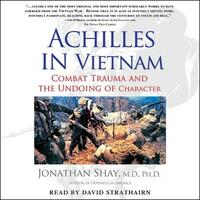Take a photo of a barcode or cover
hopeful
informative
reflective
sad
Fabulous book comparing post-traumatic stress disorder in Vietnam vets with accounts in Homer's Iliad. The premise and methodology were both interesting and I thought the book was quite well-written.
Ultimately I felt that the book reinforced the notion that war is extremely damaging to soldiers and civilians alike, regardless of which side "wins."
Ultimately I felt that the book reinforced the notion that war is extremely damaging to soldiers and civilians alike, regardless of which side "wins."
Powerful. Difficult.
This book is changing the way I look at Homer's Iliad.
This book is changing the way I look at Homer's Iliad.
A powerful study of the impact of PTSD on the human personality, using the Iliad and other classic literary portraits of traumatized warriors to illustrate the timelessness of this problem with special emphasis on the reasons that the Vietnam war was a more shattering experience for many veterans than other wars have been.
"The Iliad is the story of the undoing of Achilles' character."
challenging
dark
emotional
informative
reflective
medium-paced
Wow. There are very few times I have finished a book and felt like a markedly different person after reading it, but this is one of those times. I have a few gripes with the author. He clearly has a distaste for Christianity, and at times went out of his way (to the detriment of his arguments) to talk against it. He also clearly lacked context for certain Biblical passages and seemed to cherry pick Biblical instances from which to extrapolate wild conclusions. Despite this, I’ve chosen to rate this 5 stars out of respect for the point of the book and the veterans it speaks for. A handful of pages which I found lacking and biased does not erase the profound impact the book as a whole has had on me. War is a thing with which I am (blessedly) unfamiliar. This book has given me deep insights into the reality of it, and exponentially furthered my respect for veterans and the complexity of the moral dilemmas they face. Be forewarned that this is a very distressing read, but it would fail in its purpose if it were anything else. I recommend it highly and urge any Christian readers to consider the issues posed with a Biblical perspective.
Graphic: Death, Emotional abuse, Violence, Grief, War
Moderate: Addiction, Child death, Cursing, Domestic abuse
Achilles in Vietnam is a fascinating and powerful examination of The Iliad as a soldier’s narrative that details Achilles’s moral breakdown that results from combat trauma and PTSD as viewed through the lens of equivalent suffering by Vietnam veterans. Written by a trained psychotherapist and amateur classist with years of experience treating Vietnam vets with severe and chronic PSTD, the book outlines the common sequential factors that led to PTSD in both his patients and Achilles, which include a betrayal of “what’s right” (what Homer calls thémis) by higher-ups, the shrinkage of the soldier’s social and moral horizon, his grief at the death of a special comrade, his guilt at the wrongful substitution of the comrade’s death in place of his own, and going berserk (a sustained and clinical state of being). To illustrate these similarities, the author provides numerous lengthy transcripts of Vietnam vets with severe PTSD describing their experiences and the state of their lives today, contrasting them with passages from The Iliad, all of which are essentially saying the same thing.
From there, the author discusses more experiences and reactions of both ancient and modern soldiers that are similar (e.g. conceptions of luck and the role of higher-up powers-that-be, be they the modern military top brass or the ancient Olympian gods), as well as some major societal differences in the procedural and logistical execution of war and conception the enemy (seen as honourable in ancient times vs. dehumanized during Vietnam) that made the Vietnam War in particular so psychologically damaging. He ends with a section on healing, posing the question of whether full recovery for Vietnam vets is possible (the short answer is essentially “it’s complicated”) and on how modern warfare needs to change to be more protective of soldiers’ mental capacity, which he views as an interim step to society hopefully someday evolving beyond the need for war at all.
The book is brilliantly educational and utterly compelling. The accounts of the Vietnam vets (which are masterfully performed by an actor in the audiobook to represent the diverse speech patterns of each person quoted) are harrowing to take in, both in terms of what they say, which is gruesome and heartbreaking, and also often how they say it. This latter negative reaction, the author explains, is a natural protective measure by the listener to deny how easily any of us could experience a similar moral breakdown under similar circumstances, yet at the same time is a wholly unhelpful reaction for the veteran. Rather, a veteran’s treatment depends on people being able to hold space in hearing about their experiences in order for the communalization of their trauma and grief since the absence of opportunities to do so can lock the person into chronic rage and leave them with other lifelong, debilitating symptoms of PTSD that incapacitate victims from participation in domestic, economic, and political life.
The author’s stated goal in writing this book is to educate and motivate mental health professionals in their work with combat PTSD patients, and to further educate all readers on the damage war does to both the mind and spirit with an even larger, underlying goal of working to prevent war altogether. The empathy and compassion present in the book is undeniable and I hope that his patients are able to realize some improved mental health under his care.
Repetitive
Case examples are a little repetitive. Started out strong and then just became a dull examination of the same stories.
Case examples are a little repetitive. Started out strong and then just became a dull examination of the same stories.
adventurous
challenging
dark
emotional
informative
medium-paced
dark
informative
reflective
sad
slow-paced






